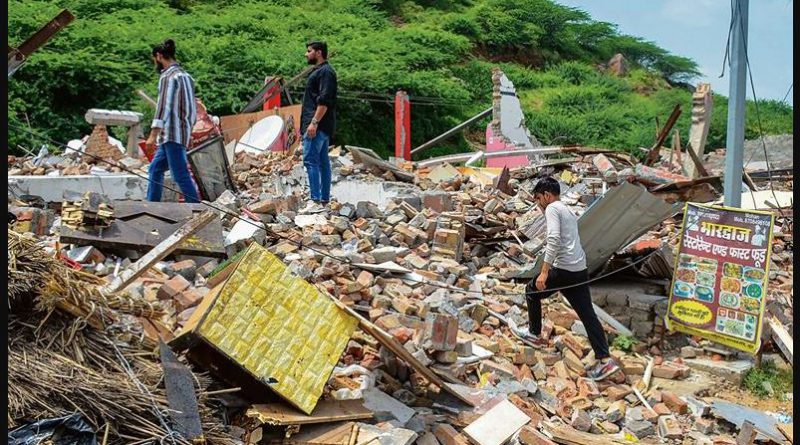INDIA: 71 Hindus, 283 Muslims affected by demolition drive in Nuh, no religious-based discrimination
The number of individuals affected by the demolition drive was reported as 354, with 71 Hindus and 283 Muslims among them.
India’s Haryana government has provided a detailed response to the controversy surrounding the demolition drive carried out in Nuh district. The Punjab and Haryana High Court had raised concerns over the demolitions, questioning whether the state was engaging in “ethnic cleansing”. The government’s response includes a demographic breakdown of the affected individuals, asserting that the demolitions were not based on religion but were a necessary action against unauthorized encroachments.
During a brief hearing, the Division Bench of Chief Justice Ravi Shanker Jha and Justice Arun Palli instructed Nuh Deputy Commissioner Dhirendra Khadgata to submit his response to the Punjab and Haryana High Court Registry. Additional Advocate-General Deepak Sabharwal informed the Bench that the necessary rebuttals, as per the court’s directives, had been prepared.
The response from the Nuh deputy commissioner highlighted that a comprehensive report detailing the demolitions conducted in the past two weeks until August 7th was requested from all heads of departments in the district. According to the report, a total of 443 structures were demolished, out of which 162 were permanent and 281 were temporary. The number of individuals affected by the demolition drive was reported as 354, with 71 Hindus and 283 Muslims among them.
The report further emphasized the demographic composition of Nuh district. The 2011 census data indicated that Nuh had a population of 1,089,263, with Muslims accounting for 79.20% and Hindus for 20.37%. It also mentioned that the projected population of Nuh in 2023 is 1,421,933. In Punhana tehsil, Muslims constitute 87% of the population, and in Ferozepur Jhirka, they make up 85% of the population.
The affidavit submitted by the deputy commissioner stated that all demolitions followed proper legal procedures. No structures were demolished without adhering to the necessary legal requirements. The response emphasized that the government did not adopt a discriminatory approach based on caste, creed, or religion during the removal of encroachments or unauthorized constructions.
Supporting this stance, Gurugram Deputy Commissioner Nishant Kumar Yadav stated that the state government did not collect any information regarding caste, creed, or religion while gathering details about encroachments. All encroachers were treated equally according to the law.
The government’s response also highlighted that the demolitions were carried out in response to court orders. The apex court and high court have repeatedly directed state governments and local authorities to demolish or remove unauthorized encroachments on government, panchayat, or local body lands. The demolitions in question were regular actions conducted by autonomous local authorities against illegal occupants or structures, following the correct legal procedures.
With the submission of this comprehensive response, the Haryana government aims to address the concerns raised regarding the demolitions in Nuh district. The demographic breakdown provided seeks to clarify that the actions were not driven by religious bias but were a necessary response to unauthorized encroachments, in line with the court’s directives. The matter will now be further reviewed by the Punjab and Haryana High Court.



